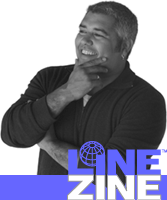
This
issue, like so much of the media coverage of the last year,
was conceived in the months following the September 11 terrorism
attacks. “Readiness” was in the air, as it continues to be,
as our nation—and all institutions—raise their preparedness
to prevent or thwart other threats in the future. Building an
organizational capability to respond seemed an appropriate theme
for an issue, given not only the shadow of terrorism, but also
the obvious link of readiness to learning and human capital
management that stand at the heart of the LiNE Zine agenda.
Strangely
enough, contemporary discussion about organizational readiness
does not necessarily lead all people to questions of learning
and human capital. About six weeks after the September 11 events,
I attended a conference on “government excellence” which convened
several senior Federal executives to talk about their accelerating
efforts to prepare the U.S. government for the new cause against
terrorism. At the conference, I listened to a distinguished
panel of leaders from the U.S. Dept of State, Health and Human
Services, U.S. Post Office and other agencies speak patriotically
and fervently about what they were doing. At that point, not
one of the speakers mentioned anything about increasing learning
capability or building the skills and experience of the people
in their organizations to face the new threats. Instead, the
immediate rhetoric was about—you guessed it—technology: how
woefully underinvested this or that agency was; how new tools
were being rolled into position, but the challenges of implementation;
about the promise of new smart weapons and communications systems
that would eventually win the day.
We
at LiNE Zine are not Luddites about technology and its progress,
but I must say the remarkable lack of focus on people was more
than a little distressing. The knee-jerk reaction, placing tools
and systems first, is all too familiar in a world that has not
yet fully realized that management of human capital is strategic
for all organizations. All the tools and technologies in the
world are not worth anything if not integrated with a flesh
and blood organization that knows how, when, and why to use
them, and continuously improves its effectiveness based on learning.
In
recent weeks, the importance of organizational and people issues
has risen in the public debate, though regrettably through the
revelations of how many opportunities for “readiness” were missed
since September 11, due to in-fighting and lack of coordination
among our so-called intelligence agencies. For all the criticisms
of President Bush’s new restructuring plan for homeland security,
at least it recognizes the importance of organizational readiness
first. Bottom line, as a nation, we still have a lot of learning
about learning to do.
At
the same time, it’s important to understand that the need for
organizational readiness was not suddenly invented on Sept.
11. As long as institutions, countries, companies, or organizations
have had to prepare for and adapt to sudden and unexpected change,
developing readiness has been an imperative. Which is to say—always
has, always will. Today’s global economy promises only more
shocks, surprises, and the need for adaptation.
We
offer up this issue of LiNE Zine for its insights and perspectives
on the state of the question. Please click through; we’re ready
when you are.

Brook
Manville, Publisher
brook@linezine.com
June
11, 2002



